On May 25, the National Assembly discussed in the hall the Report of the Supervisory Delegation and the draft Resolution of the National Assembly on the results of the thematic supervision of the implementation of Resolution No. 43/2022 of the National Assembly on fiscal and monetary policies to support the Socio-Economic Recovery and Development Program and the National Assembly's resolutions on a number of important national projects until the end of 2023.
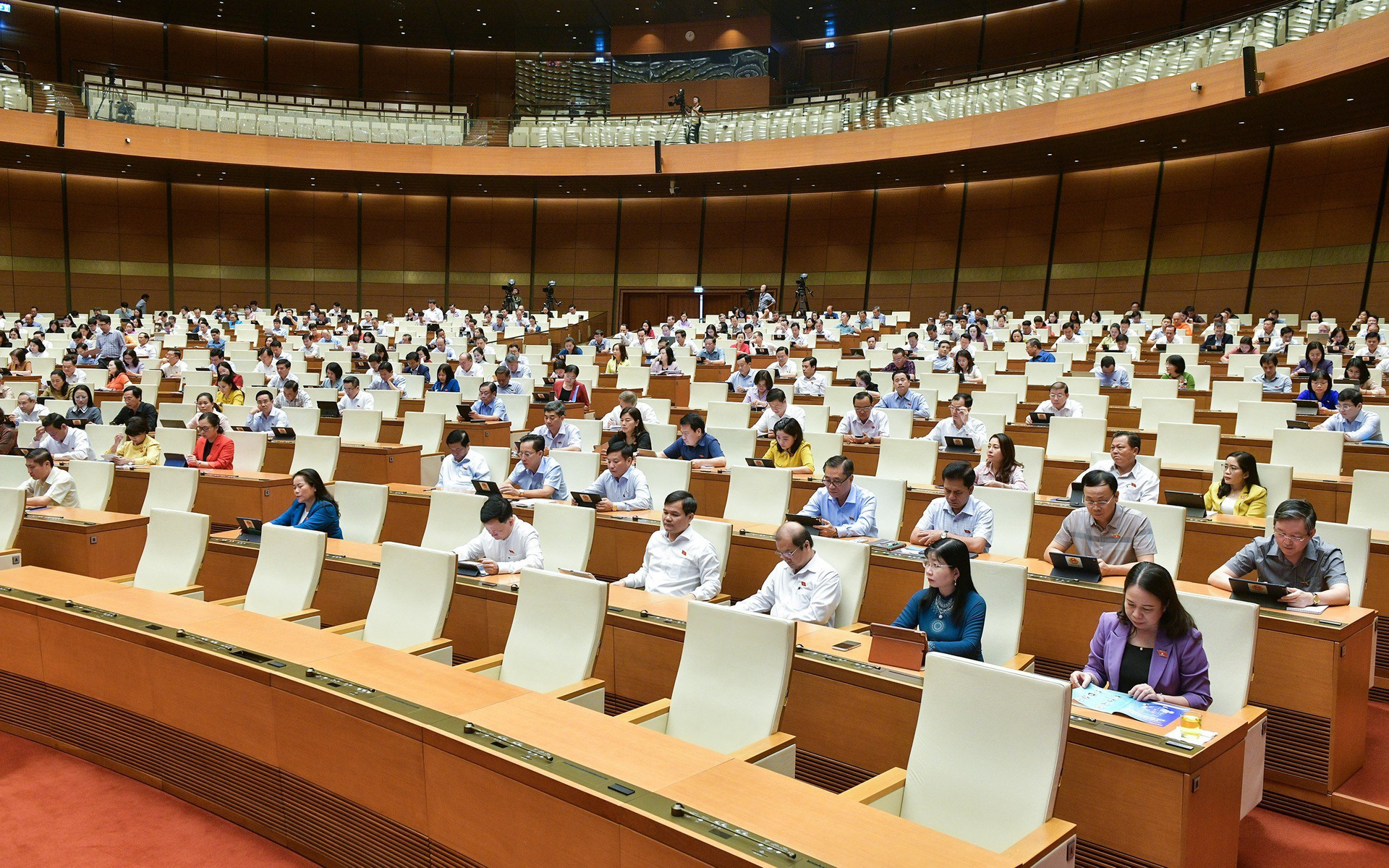
Issuance of documents is still slow.
Speaking at the conference, many delegates basically agreed that the issuance of fiscal and monetary policies to support the socio-economic recovery program under Resolution No. 43 is a correct and timely decision with many innovations and creativity. The Resolution allows the use of a huge resource with many unprecedented policies that have brought about positive effects, contributing significantly to ensuring social security, maintaining macroeconomic stability, supporting people and businesses to overcome difficulties soon, and recover and develop the socio-economy after the pandemic.
However, besides the advantages, the implementation of Resolution No. 43 also revealed many shortcomings and limitations, affecting the results of implementing the Resolution's objectives, notably the slow development and promulgation of legal documents.
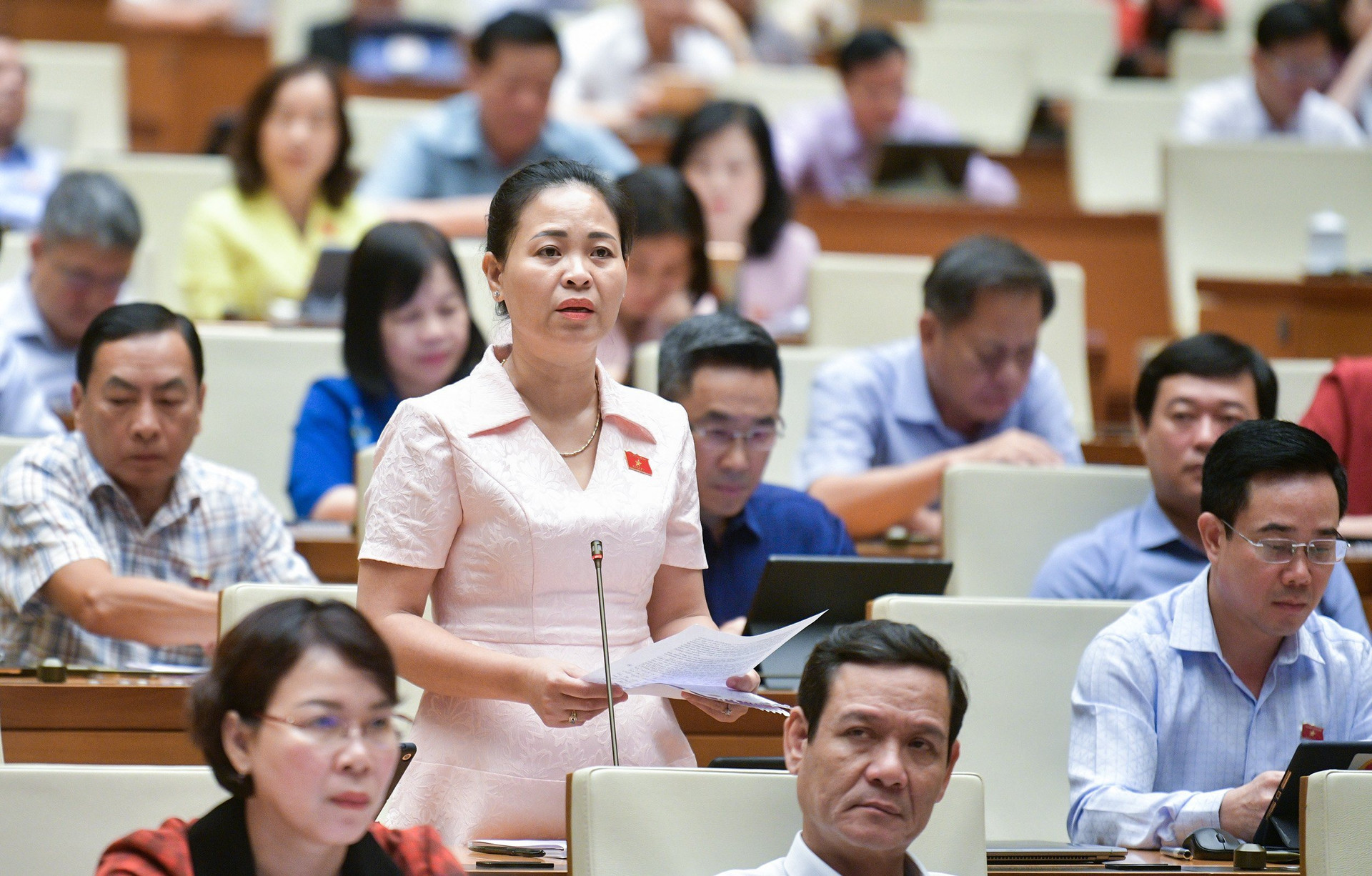
Delegate Nguyen Thi Thu Dung - Thai Binh delegation cited the policy on house rental for workers in industrial parks, export processing zones, and key economic zones, Decision No. 08/2022 of the Prime Minister issued on March 28, 2022 stipulates that the policy will be implemented until August 15, 2022, with only 4.5 months to implement, which is very urgent and difficult. Meanwhile, in some localities, the beneficiaries of this policy are up to 100,000 people, requiring time to receive documents, appraise, approve, and resolve, so there are still many workers who are beneficiaries but the policy implementation period has expired and so they are not entitled to it.
Along with that, according to delegate Nguyen Thi Thu Dung, some localities have issued additional conditions for benefits and added a list of documents to request benefits, creating additional administrative procedures, causing difficulties for workers and creating a mentality that they do not want to apply for benefits.
Another issue is the situation of specific guiding documents for some policies with unclear and inconsistent provisions, leading to slow progress, low disbursement rates, and policies that have not achieved their set goals. Specifically, according to Appendix 1 on the status of promulgation of legal documents related to the implementation of the resolution, out of 21 legal documents, only 7 documents have been promulgated and ensured progress, the remaining 14 documents are behind schedule as required, including documents issued up to 7 months late as required by the plan, such as the circular guiding tax obligations when enterprises set aside and use the enterprise's science and technology development fund, the circular on the list of quality of public telecommunications services and instructions on implementing the program of providing public telecommunications services until 2025...
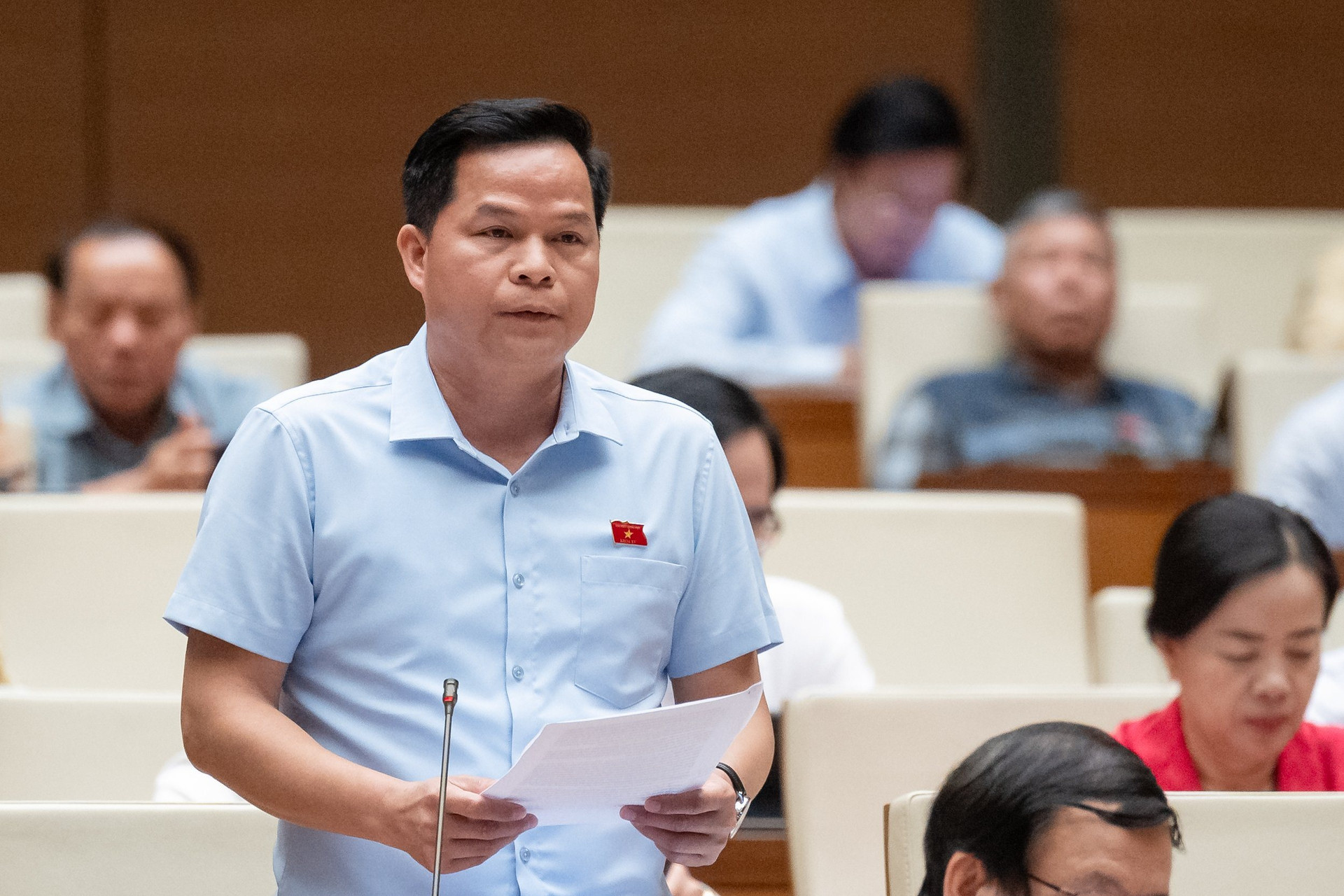
Also related to the issuance of policies, delegate Be Minh Duc - Doan Cao Bang said that the National Assembly's issuance of Resolution No. 43 is suitable to the reality in the special context and has very positive impacts, contributing significantly to the effective implementation of the Party's, the National Assembly's and the Government's policies in preventing and fighting the COVID-19 pandemic, gradually controlling and ending the COVID-19 pandemic, bringing social life back to normal, promoting the economy to overcome difficulties, recover and grow.
However, in order to organize effective and synchronous implementation and facilitate the implementation process, delegates suggested that the Government, ministries, branches and central agencies, when issuing policies, need to ensure clarity and feasibility, avoiding overlaps that lead to many ministries, branches and localities having to ask for guidance or causing unnecessary additional costs in terms of time and finance for businesses.
Delegate Be Minh Duc cited the implementation of Decree No. 31/2022 on interest rate support from the state budget for loans of enterprises, cooperatives, and business households, when determining the subjects receiving interest rate support in cases where customers operate in multiple production and business sectors, making it difficult to separate the fields receiving interest rate support as well as documents proving that the loan capital is used for the fields receiving interest rate support.
“In principle, the interest rate support regulation that "customers have the ability to repay debt and have the ability to recover" according to the internal assessment of commercial banks is still general, subjective from the bank's appraisal side and these limitations have been confirmed by the monitoring report on page 27. These are contents that need to be carefully evaluated, experience drawn in forecasting research, policy proposals and policy implementation organization", delegate Be Minh Duc emphasized.
Participating in the discussion, delegate Vu Thi Luu Mai - Hanoi City Delegation emphasized that the choice of policies and the feasibility of policies are also among the major lessons learned from the implementation of Resolution 43. The delegate said that, besides many reasonable policies, there are also policies that have not yet really come into life, such as support policies through commercial banks, capital support policies of the Tourism Development Fund or the use of the Public Telecommunications Fund.
“If we could do it again, I personally think it is very important to have a focus and key points. We do not need many policies but we need to improve feasibility and especially need to stand from the people's perspective to better understand what people really need and what businesses really want,” delegate Vu Thi Luu Mai emphasized.
Improve the process of policy development and implementation
Participating in the explanation and clarification of some issues raised by the delegates, Minister of Planning and Investment Nguyen Chi Dung thanked the National Assembly delegates for their frank and accurate opinions, which will be valuable lessons for the process of building and implementing policies in the future. The Minister said that Resolution No. 43 was built in a particularly difficult situation, when economic growth decreased sharply, businesses faced many challenges, the global supply chain was broken, requiring urgent solutions to support businesses and people to stabilize their lives and gradually recover the socio-economy.
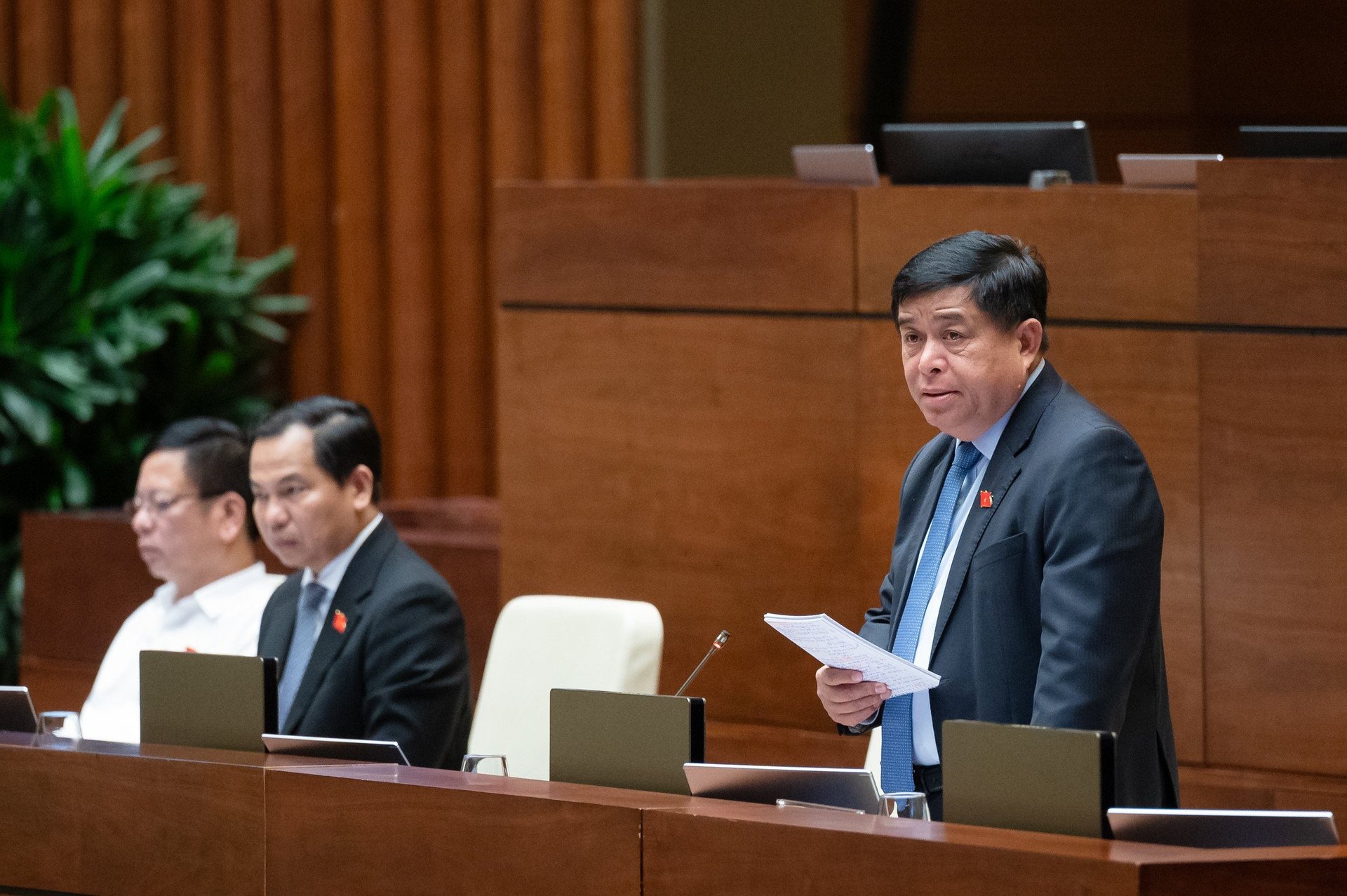
According to the Minister of Planning and Investment, the time to develop and implement the program is very short, the program is large-scale, wide-ranging, and involves many fields, organizations, and subjects; however, experience and capacity are still limited, coordination in implementing some projects is not good, creating a fear of making mistakes and responsibility among some officials, which is the reason why some results achieved are not as expected.
The Minister of Planning and Investment said that in terms of implementation, the Prime Minister, the Government, and ministries have been very active, issuing many legal documents, guiding documents, and establishing many working groups and delegations to urge implementation. All members of the Government have gone to many localities to resolve the bottlenecks and difficulties of each public investment project under the Socio-Economic Recovery and Development Program. The Minister of Planning and Investment said that he will absorb the enthusiastic opinions of National Assembly deputies, improve the process, develop and organize the implementation of policies so that the policies can be quickly put into practice.
From the process of organizing and implementing Resolution 43, Minister Nguyen Chi Dung said that some valuable lessons can be drawn. Among them is the lesson on choosing the support method. In other countries, support is implemented by directly supporting people in cash, helping to put resources into the economy and stimulate consumption. We are implementing support through policies, so there need to be documents guiding implementation and procedures according to regulations. When these steps are completed, the support package may no longer be relevant and its effectiveness has decreased. The delay in issuing documents as analyzed by delegates above is determined by our support implementation method.
Concluding the discussion session, Vice Chairman of the National Assembly Nguyen Duc Hai said that after nearly 1 day of urgent and serious work, 29 delegates spoke, 1 delegate debated, and the Governor of the State Bank of Vietnam and the Minister of Planning and Investment spoke to clarify issues of concern to delegates.
According to Vice Chairman of the National Assembly Nguyen Duc Hai, the opinions focused on analyzing the results, shortcomings, limitations, causes and responsibilities in implementing the resolution; contributing many solutions to ensure more effective results when issuing policies in urgent, urgent situations or when there are unexpected socio-economic fluctuations due to objective factors. The opinions of National Assembly deputies were recorded and fully transcribed, the National Assembly Standing Committee will direct the Supervisory Delegation and relevant agencies to study and absorb them to complete the draft Supervisory Resolution and submit it to the National Assembly for approval.
Source: https://baotainguyenmoitruong.vn/nghi-quyet-so-43-viec-xay-dung-ban-hanh-van-ban-quy-pham-phap-luat-con-cham-374634.html


![[Photo] The moment Harry Kane lifted the Bundesliga trophy for the first time](https://vphoto.vietnam.vn/thumb/1200x675/vietnam/resource/IMAGE/2025/5/11/68e4a433c079457b9e84dd4b9fa694fe)

![[Photo] National Assembly Chairman works with leaders of Can Tho city, Hau Giang and Soc Trang provinces](https://vphoto.vietnam.vn/thumb/1200x675/vietnam/resource/IMAGE/2025/5/11/c40b0aead4bd43c8ba1f48d2de40720e)
![[Photo] National Assembly Chairman Tran Thanh Man attends the Party Congress of the Committee for Culture and Social Affairs](https://vphoto.vietnam.vn/thumb/1200x675/vietnam/resource/IMAGE/2025/5/11/f5ed02beb9404bca998a08b34ef255a6)
![[Photo] Discover the beautiful scenery of Wulingyuan in Zhangjiajie, China](https://vphoto.vietnam.vn/thumb/1200x675/vietnam/resource/IMAGE/2025/5/11/1207318fb0b0467fb0f5ea4869da5517)
![[Photo] Prime Minister Pham Minh Chinh chairs the fourth meeting of the Steering Committee for Eliminating Temporary and Dilapidated Houses](https://vphoto.vietnam.vn/thumb/1200x675/vietnam/resource/IMAGE/2025/5/11/e64c18fd03984747ba213053c9bf5c5a)
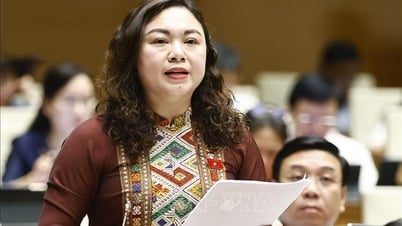

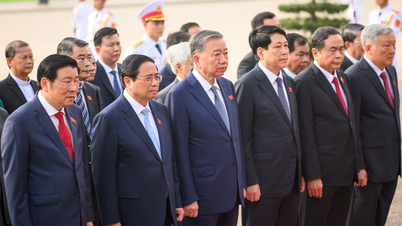














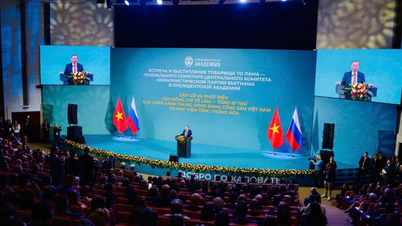









































































Comment (0)